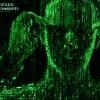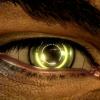This stuff is pretty intense.
In what sense?
No matter what I study, I can see patterns. I see the gestalt, the melody within the notes, in everything: mathematics and science, art and music, psychology and sociology. As I read the texts, I can think only that the authors are plodding along from one point to the next, groping for connections that they can't see. They're like a crowd of people unable to read music, peering at the score for a Bach sonata, trying to explain how one note leads to another.
As glorious as these patterns are, they also whet my appetite for more. There are other patterns waiting to be discovered, gestalts of another scale entirely. With respect to those, I'm blind myself; all my sonatas are just isolated data points by comparison. I have no idea what form such gestalts might assume, but that'll come in time. I want to find them, and comprehend them. I want this more than anything I've ever wanted before.
The quotidian patterns of society are revealed without my making effort. I walk down the street, watching people go about their business, and though not a word is spoken, the subtext is conspicuous. A young couple strolls by, the adoration of one bouncing off the tolerance of the other. Apprehension flickers and becomes steady as a businessman, fearful of his supervisor, begins to doubt a decision he made earlier today. A woman wears a mantle of simulated sophistication, but it slips when it brushes past the genuine article.
As always, the roles one plays become recognizable only with greater maturity. To me, these people seem like children on a playground; I'm amused by their earnestness, and embarassed to remember myself doing those same things. Their activities are appropriate for them, but I couldn't bear to participate now; when I became a man, I put away childish things. I will deal with the world of normal humans only as needed to support myself.
My sensitivity to the body language of others has increased to the point that I can make observations without sight or sound: I can smell the pheromones exuded by skin. To an extent, my muscles can even detect the tension within, perhaps by their electric field. These channels can't convey precise information, but the impressions I receive provide ample basis for extrapolation; they add texture to the web.
Normal humans may detect these emanations subliminally. I'll work on becoming more attuned to them; then perhaps I can try consciously controlling my own expressions.
The sign language of emotion I once knew has been replaced by a matrix of interrelated equations. Lines of force twist and elongate between people, objects, institutions, ideas. The individuals are tragically like marionettes, independently animate but bound by a web they choose not to see; they could resist if they wished, but so few of them do.
I'm designing a new language. I've reached the limits of conventional languages, and now they frustrate my attempts to progress further. They lack the power to express concepts that I need, and even in their own domain, they're imprecise and unwieldy. They're hardly fit for speech, let alone thought.
I'm writing part of an extended poem, as an experiment; after I've finished one canto, I'll be able to choose an approach for integrating the patterns within all the arts. I'm employing six modern and four ancient languages; they include most of the significant worldviews of human civilization. Each one provides different shades of meaning and poetic effects; some of the juxtapositions are delightful. Each line of the poem contains neologisms, born by extruding words through the declensions of another language. If I were to complete the entire piece, it could be thought of Finnegans Wake multiplied by Pound's Cantos.
I view the tapestry of human knowledge from a broader perspective than anyone ever has before; I can fill gaps in the design where scholars never even noticed a lack, and enrich the texture in places that they felt were complete.
The natural sciences have the clearest patterns. Physics admits of a lovely unification, not just at the level of fundamental forces, but when considering its extent and implications. Classifications like "optics" or "thermodynamics" are just straitjackets, preventing physicists from seeing countless intersections. Even putting aside aesthetics, the practical applications that have been overlooked are legion; years ago engineers could have been artifically generating spherically symmetric gravity fields.
I know my body afresh, as if it were an amputee's stump suddenly replaced by a watchmaker's hand. Controlling my voluntary muscles is trivial; I have inhuman coordination. Skills that normally require thousands of repetitions to develop, I can learn in two or three. I find a video with a shot of a pianist's hands playing, and before long I can duplicate his finger movements without a keyboard in front of me. Selective contraction and relaxation of muscles improve my strength and flexibility. Muscular response time is thirty-five milliseconds, for conscious or reflex action. Learning acrobatics and martial arts would require little training.
I have somatic awareness of kidney function, nutrient absorption, glandular secretions. I am even conscious of the role that neurotransmitters play in my thoughts. This state of consciousness involves mental activity more intense than in any epinephrine-boosted stress situation; part of my mind is maintaining a condition that would kill a normal mind and body within minutes. As I adjust the programming of my mind, I experience the ebb and flow of all the substances that trigger my emotional reactions, boost my attention, or subtly shape my attitudes.



























































